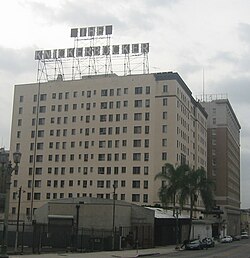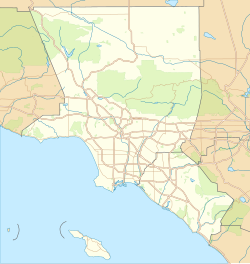The Hollywood Knickerbocker Apartments, formerly the Hollywood Knickerbocker Hotel, is a historic former hotel, now retirement home, located at 1714 Ivar Avenue in Hollywood, California.
Hollywood Knickerbocker Hotel | |
 Knickerbocker in 2006 | |
Location of building in Los Angeles County | |
| Location | 1714 Ivar Avenue, Hollywood, California |
|---|---|
| Coordinates | 34°06′09″N 118°19′40″W / 34.10243°N 118.32779°W |
| Built | 1925[1] or 1929[2] |
| Architect | John M. Cooper[2] and/or E. M. Frasier[3] |
| Architectural style | Spanish Colonial[3] and/or Renaissance Revival/Beaux Arts[4] |
| Part of | Hollywood Boulevard Commercial and Entertainment District (ID85000704) |
| Designated CP | April 4, 1985 |
History
editBeginnings
editDesigned by John M. Cooper[2] and/or E. M. Frasier,[3] the Hollywood Chamber of Commerce cite the Knickerbocker as opening as a luxury apartment house in 1925 and then converting to a hotel,[1] while the United States Department of the Interior cite the Knickerbocker as opening as a hotel 1929.[2] Los Angeles's Water and Power Associates cite the building as featuring Spanish Colonial and Renaissance Revival/Beaux Arts architecture on different pages of the same document.[3][4]
Golden Age
editThe Knickerbocker catered to the region's nascent film industry, was frequented by several of the industry's biggest stars, and was the site for some of the area's most famous moments. Rudolph Valentino was said to be a frequent guest,[1][3] although that is only possible if the building opened in 1925 and not 1929, as Valentino died in 1926.[5] In October 1935, Betty Grable hosted a costume party to celebrate Jackie Coogan's 21st birthday in the hotel, with Lucille Ball, Johnny Mercer, and one of the Dionne quintuplets in attendance.[6] On Halloween 1936, in what would become a media sensation, Bess Houdini held her tenth and final séance to contact her dead husband on the hotel's roof.[5]
On January 13, 1943, Frances Farmer was arrested at the hotel after failing pay multiple DUI fines. Naked and refusing to cooperate, she was carried through the hotel kicking, spitting, screaming, and wrapped in a shower curtain.[5] D. W. Griffith spent the last year of his life at the hotel,[5] and according to the Los Angeles Times on July 23, 1948, he died after being discovered unconscious in the hotel's lobby.[7] However, Griffith may not have collapsed in the lobby at all, as other newspapers reported that Griffith had been "stricken inside his hotel room."[8]
The hotel retained its glamor and notoriety through the 1950s. Marilyn Monroe and Joe DiMaggio often met at the hotel bar.[1] On December 1, 1954, a camera crew from the NBC show This Is Your Life surprised retired comedy legends Stan Laurel and Oliver Hardy in room 205, something the duo did not appreciate.[9] Elvis Presley stayed in room 1016 while making his first film, Love Me Tender.[10] In 1962, celebrated costume designer Irene Lentz committed suicide by jumping from an 11th-floor window.[11]
On March 3, 1966,[12] veteran character actor William Frawley was walking down Hollywood Boulevard when he suffered a heart attack. According to Bart Andrews, after Frawley had collapsed, a nurse had dragged him to the Knickerbocker where he died in the lobby.[13] However, this may be apocryphal because there are no newspapers from 1966 that mention Frawley ever being taken to the Knickerbocker, which was located half a block up a hill from where he collapsed, and the Los Angeles Times reported that Frawley died in the street.[14] Contrary to popular belief, Frawley did not live in the Knickerbocker at the time of his death, as although he had spent nearly 30 years living in an upstairs suite, he moved to the El Royale several months before he died.
Other notable Knickerbocker guests during the building's heyday include Frank Sinatra, Lana Turner, Mae West, Cecil B. DeMille, Red Skelton, Bette Davis, Cary Grant, Maureen O'Sullivan, Elinor Mordaunt, Louis B. Mayer, Howard Hughes, and more.[1][3][6]
Deterioration and restoration
editBy the late 1960s, the neighborhood around the Knickerbocker had deteriorated, and the Knickerbocker itself became a residence primarily for drug addicts and prostitutes.[citation needed] In 1970, the hotel was converted into senior housing.[3]
In 1984, the Hollywood Boulevard Commercial and Entertainment District was added to the National Register of Historic Places, with Knickerbocker Hotel listed as a contributing property in the district.[2] In 1999, a plaque honoring Griffith was placed in the building's lobby.
In 1998, the Knickerbocker's neon sign was illuminated after being dark for decades, part of an effort to restore Hollywood's old brilliance and verve.[6]
Filming location
editThe building's central-Hollywood location has resulted in it appearing in numerous film and television productions, either directly or indirectly. For example, in the 1936 film The Reckless Way, Marian Nixon's character worked in the hotel. In the 1950 film 711 Ocean Drive, the hotel was the backdrop of a syndicate meeting. The hotel and its surroundings also served as the backdrop for the opening scene of a first-season episode of the 1966 series Mission Impossible.
Between 1964 and 1970, viewers of the ABC variety series The Hollywood Palace would regularly see the hotel and its neon sign in the background of performances taped in the Hollywood Palace's parking lot, located directly behind the hotel.
The sign over the building's front entrance identifying it as a hotel was still in place when the TV series Mannix filmed a scene there for the 1970 episode, "Only One Death to a Customer" (Season 3, Episode 20).
See also
editReferences
edit- ^ a b c d e "Knickerbocker Hotel - Hollywood Historic Site". Hollywood Chamber of Commerce. Retrieved June 29, 2024.
- ^ a b c d e "National Register of Historic Places Registration Form - Hollywood Boulevard Commercial and Entertainment District". United States Department of the Interior - National Park Service. April 4, 1985.
- ^ a b c d e f g "Early Views of Hollywood (1920 +)". Water and Power Associates. p. 6. Retrieved June 29, 2024.
- ^ a b "Early Views of Hollywood (1920 +)". Water and Power Associates. p. 12. Retrieved June 29, 2024.
- ^ a b c d Meares, Hadley (June 19, 2015). "Off the Boulevard of Broken Dreams: The Knickerbocker Hotel's Haunted History". PBS SoCal.
- ^ a b c "Early Los Angeles Historical Buildings (1925 +)". Water and Power Associates. p. 6. Retrieved June 29, 2024.
- ^ Pioneer Film Man D.W. Griffith Dies. Los Angeles Times, July 24, 1948.
- ^ D.W. Griffith, Famed For 'Birth of Nation,' Dies In Los Angeles, The Californian, July 23, 1948
- ^ This is Your Life - December 1, 1954 Laurel & Hardy episode
- ^ Lord, Rosemary (2003). Hollywood Then and Now. San Diego: Thunder Bay Press. p. 87. ISBN 1-59223-104-7.
- ^ Designer Irene Suicide, Los Angeles Evening News, November 16, 1962
- ^ Rasmussen, Cecilia (26 July 1998). "Hotel Was Historic Host to Hollywood Headliners". Los Angeles Times. Retrieved 13 September 2018 – via LA Times.
Four years later, William Frawley, best known as Fred Mertz on TV's "I Love Lucy," walked out of the hotel's bar--where he always ordered a walnut with his drink--and dropped dead on the sidewalk. Rassmusen's account, however, appears to be based on a press release containing incorrect information generated by the short-lived All-Star Cafe that once occupied a part of the hotel. By 1966, when Frawley died, the Knickerbocker had become something of a dump.
- ^ The "I Love Lucy" Book: Including a Revised, Expanded, and Updated Version of Lucy & Ricky & Fred & Ethel, Bart Andrews, p. 219
- ^ Actor William Frawley, 73, Dies On Street, Dick Main, Los Angeles Times, March 4, 1966
